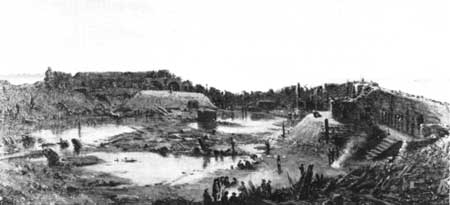|
FORT SUMTER National Monument |
 |

"Fort Sumter: Interior Sunrise, December 9, 1864"
painted by Conrad Wise Chapman.
Courtesy Confederate Museum,
Richmond.
Fort Sumter
Strengthened
In the preceding December, Fort Sumter had been an "almost chaotic ruin." At night, below the "rugged outline of the ramparts," wrote one of the garrison, all was—
"dark with piles of disordered material; a chance shower of sparks blows out from smouldering fire and lights up some great rough blocks of brick work and the pools of stagnant water into which they have been violently thrown some days before. Or lanterns move about in unseen hands, some to light a way for long trains of men roiling with heavy timbers and bags of sand over the roughest footing and up steep and uncertain, rumbling slopes; some to direct the heaping of material over old damaged hiding places repaired for the twentieth time since the firing began, or to build up newer and more lasting shelters for the garrison. . . .
With the fort practically left alone during the months immediately following, the garrison gradually restored order from chaos. The parade ground, excavated well below high-water level to provide sand-filling, was cleared, drained, and partially rebuilt. Trim ranks of gabions (wicker baskets filled with sand) bolstered the sloping debris of the walls on the interior. The three-gun battery in the lower right face was lined with logs and planks, 10 feet deep, and reverted more thoroughly in the rear. In casemates of the left flank another three-gun battery was created. Through the disordered debris of the left and right faces, the garrison tunneled a 275-foot timbered gallery connecting the two batteries and fort headquarters in the left flank. In from the rubble of the "sea front," the garrison built a loopholed timber blockhouse to cover the parade ground in the event of further assault. In May, Capt. John C. Mitchel, son of the Irish patriot, relieved Lt. Col. Stephen Elliott in command.

|
|
Last Modified: Mon, Dec 2 2002 10:00:00 am PDT |


